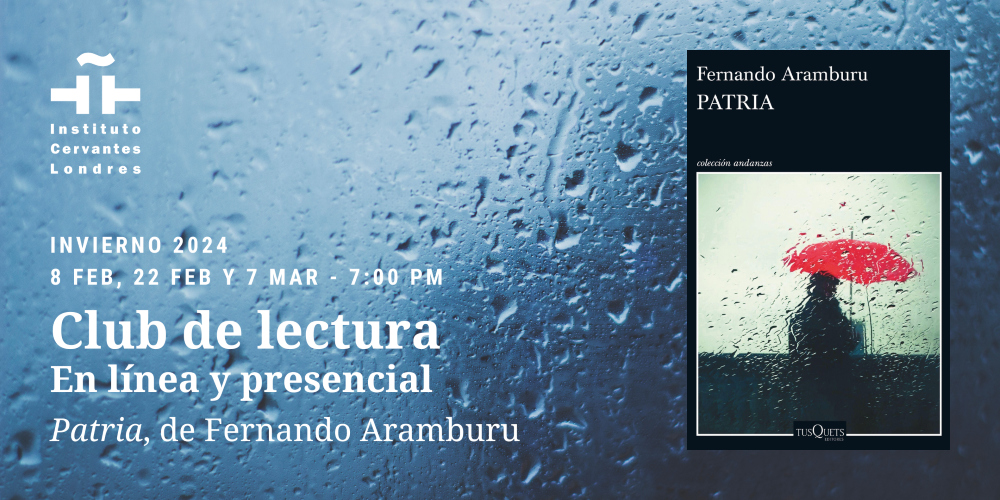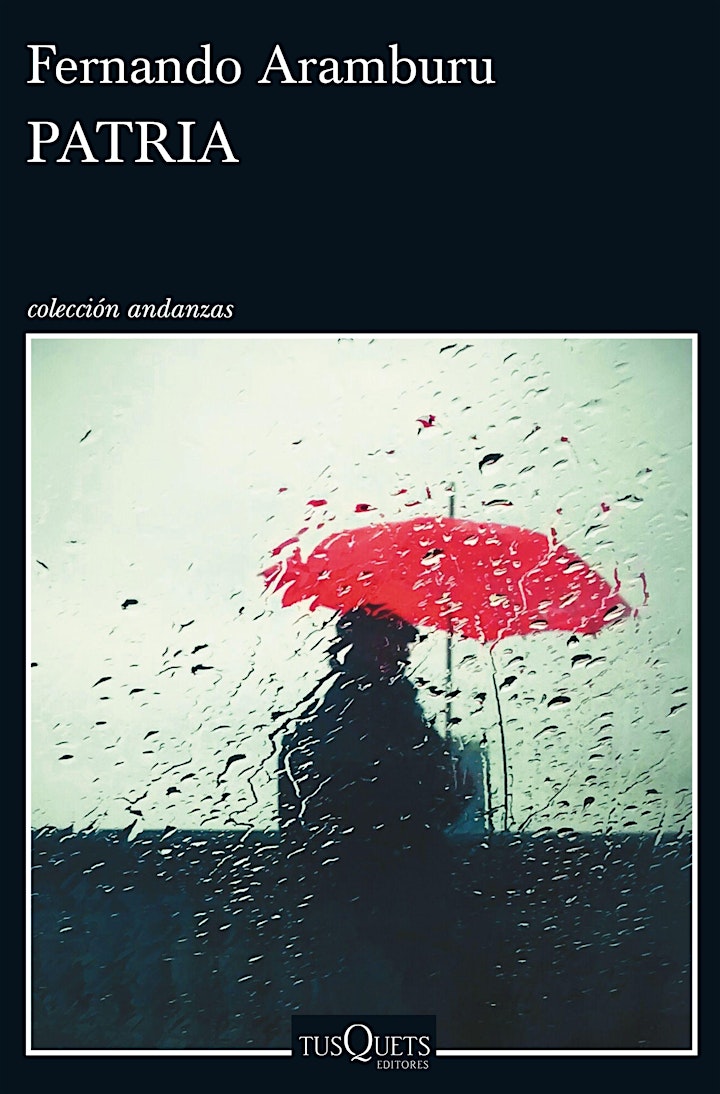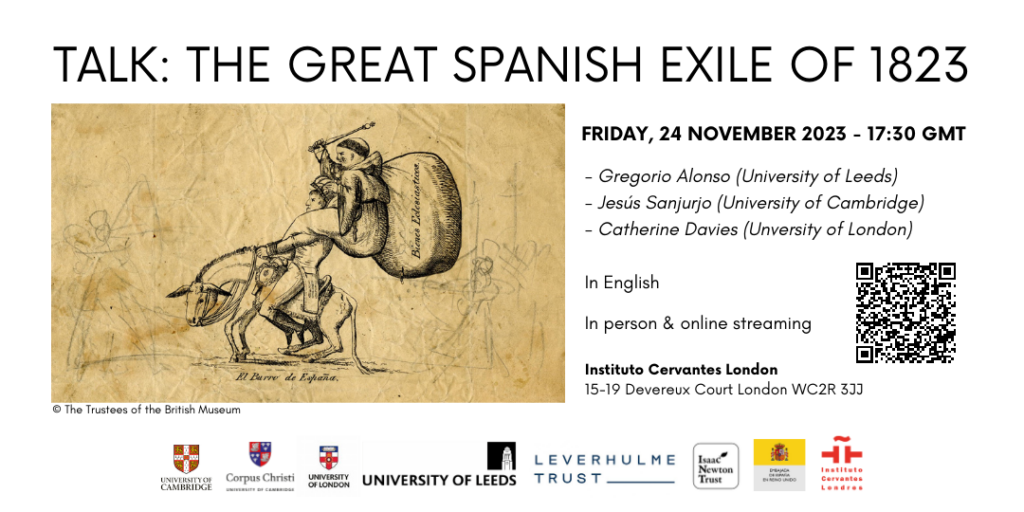Farewell/despedida
Instituto Cervantes London informs you that this blog has been temporarily suspended. While we will not be updating it with new entries, we will keep the ones we have shared with you over the years available. We would simply like to offer you our sincere thanks for reading us until now, and we hope you will be able to do so again in the future.
In the meantime, we will continue to keep you in the loop for all our activities at https://londres.cervantes.es/. Additionally, you can follow us on our social media channels.
Instagram
Facebook
BlueSky
LinkedIn
X
See you there!
Desde la sede del Instituto Cervantes en Londres os queremos comunicar que la actividad de este blog queda temporalmente suspendida. Si bien no lo actualizaremos con nuevas entradas, mantendremos publicadas las que hemos ido compartiendo con vosotros en estos años. Solo queremos daros las gracias por habernos leído hasta este momento, y esperamos que podáis volver a hacerlo en el futuro.
Entretanto, seguimos informándoos de todas nuestras actividades en https://londres.cervantes.es/. Y, además, os invitamos a seguirnos en nuestras redes:
Instagram
Facebook
BlueSky
LinkedIn
X
New Spanish courses starting in January
¿Por qué aprender español? Hablada por casi 600 millones de personas, el español es la lengua oficial en 21 países. España es uno de los destinos vacacionales más populares para los británicos y el conocimiento del español puede mejorar los ingresos entre un 30 % y un 50 %. ¡Aprende español con nosotros!
Why learn Spanish? Spoken by almost 600 million people, Spanish is the official language in 21 countries. Spain is one of the most popular holiday destinations for the Brits and knowledge of Spanish can improve earnings by between 30% and 50%. Learn Spanish with us!
Season’s Greetings And Happy New Year!

¡Felices Fiestas y próspero Año Nuevo!
Our e-library is open 24/7
Dive into the world of endless possibilities!
Whether you’re a night owl or an early bird, our eLibrary is here for you 24/7!
Immerse yourself in captivating stories, explore new worlds, and feed your mind with knowledge anytime, anywhere!
Club lectura español: Patria, de Fernando Aramburu (8 feb, 22 feb y 7 mar)
El Club de lectura del Instituto Cervantes de Londres dedicará tres sesiones, dos en febrero y una en marzo a la lectura de la novela Patria, del escritor español Fernando Aramburu.
Jueves, 8 de febrero. 19:00 h. – Capítulos 1 hasta el 43
Jueves, 22 de febrero 19:00 h. -Capítulos 44 hasta el 83
Jueves, 7 de marzo 19:00 h. – Capítulos 84 hasta el 125
Presencial o en línea – Híbrido
Patria sitúa su historia en un pueblo ficticio de la provincia de Guipúzcoa en 2011, momento en que la banda terrorista ETA anuncia su abandono de las armas. Bittori, viuda de una víctima de ETA, decide entonces volver al pueblo que una vez tuvo que dejar por el clima de represión que se vivía. Y aunque las cosas parecen estar tranquilas ahora, la llegada de Bittori removerá las aguas y causará agitación entre los vecinos, algunos de los cuales son antiguos amigos de la familia, como es el caso de Miren, quien fuera otrora su mejor amiga, y que es madre de un etarra encarcelado de quien Bittori sospecha que pudiera ser el asesino de su marido.
Entradas
- Actividad gratuita para los socios de la biblioteca del Instituto Cervantes de Londres
- No socios de la biblioteca: 5£
- Elige entre modalidad en línea o presencial al hacer tu reserva
The Instituto Cervantes London Book Club will dedicate the months of February and March in three sessions to reading the novel Patria (Homeland), by the Spanish writer Fernando Aramburu.
Thursday, 8 February. 19:00 h. – Chapters 1 to 43
Thursday, 22 de febrero 19:00 h. – Chapters 44 to 83
Thursday, 7 de marzo 19:00 h. – Chapters 84 to el 125
In-person and online – Hybrid
Patria places its history in a fictional town in the province of Guipúzcoa in 2011, when the terrorist group ETA announced the abandonment of arms. Bittori, the widow of an ETA victim, decides then to return to the town that she once had to leave due to the climate of repression. Although things seem to be calm now, the arrival of Bittori will stir the waters and cause agitation among the neighbours, some of whom are old acquaintances of the family, as is the case of Miren, who was once her best friend, and who is the mother of a jailed ETA member whom Bittori suspects may be her husband’s murderer.
Tickets:
• Free for Instituto Cervantes London library members.
• Non-members: £5
• When booking, please select whether you will attend face-to-face or online.
Instituto Cervantes London hosts historical talk titled ‘The Great Spanish Exile of 1823’
Instituto Cervantes London welcomes Dr Gregorio Alonso (University of Leeds), Dr Jesús Sanjurjo (University of Cambridge) and Professor Catherine Davies (University of London) to explore a period of history not often discussed in a talk titled ‘The Great Spanish Exile of 1823’ on Friday, 24 November at 5:30pm.
The three academics will discuss this important event in Spanish history, which marked a period of political upheaval and forced departure of many liberal and progressive Spaniards, either by choice or to avoid political persecution.
This in-person and online activity is co-hosted by the Spanish Embassy to the United Kingdom and Instituto Cervantes London. «Since its creation, Instituto Cervantes London has been emphasising how the Hispanic presence in London adds value and contributes to the city’s cultural richness and diversity. Examples of this are the Cervantes Routes, specifically the ‘Routes of the Spanish exiles in London’ itineraries. On this occasion, three experts will tell the stories of the hundreds of Spaniards who were taken in and found protection,” says Víctor Ugarte, Director of Instituto Cervantes London.
Liberal exodus to London
After close collaboration between Great Britain and the Spanish authorities from 1808, the French occupation decreed by the Holy Alliance destroyed the liberal experience in September 1823. As a result, at least 1,000 Spanish families sought refuge in London.
Most of them lived in the London suburb of Somers Town, in the Euston-St Pancras area, where a tight-knit community quickly formed. The majority of the refugees were military officers, but noted intellectuals, politicians and skilled workers were also among them. Many were highly educated and put their minds to writing, translating and publishing to make a living.
Some of the most prominent liberal politicians and essayists of the time actively participated in a wave of new intellectual activity catalysed by London’s vibrant political and cultural life. Furthermore, London became a central hub for Spanish-speaking intellectuals from Spain and the Americas during this time.
Forced emigrations for ethnic and political reasons
Throughout history, Spain has witnessed various forced emigrations for ethnic and political reasons, such as the expulsion of Jews and Muslims who refused to convert to Christianity and the exile of more than half a million citizens in 1939.
«This was the case for more than 1,000 individuals who found refuge in London in 1823, following the restoration of the absolutist regime under Ferdinand VII. This episode has received some academic attention, but much remains unknown,» explains Jesús Sanjurjo, Early Career Fellow of the Leverhulme and Isaac Newton Trusts at the University of Cambridge and Corpus Christi College.
Spain became a focal point for British politics following the intervention of its armies in the war against Napoleon a few years earlier. Similarly, Britain had been regarded from Spain with a mixture of admiration, disdain and envy for some time, adds Sanjurjo.
“This is partly because the early industrialisation success of the British Isles was giving new impetus to their economy and international reputation. In 1823, London was competing on equal footing with Paris in its race to become the great metropolis of the West,” notes Dr Gregorio Alonso, Associate Professor in Hispanic History at the University of Leeds.
The city’s capacity to welcome and the material support it provided to political refugees was extended not only to the Spanish liberals fleeing Ferdinand’s repression, but also to the Greeks, Neapolitans, Prussians and Frenchmen who sought refuge in the British capital.
“This event will describe the men and women who found in London the protection and refuge that their homeland denied them and will also reflect on the difficulties they faced and the links they established with the people of London,” underlines Catherine Davies, Emerita Professor of Hispanic and Latin American Studies at the School of Advanced Study at the University of London.
Attention will also be paid to their relationship with the so-called American insurgents, who tried to forge alliances with the British authorities to throw off the Spanish imperial yoke. Thus, the event will explore the means by which London became the capital of Hispanic liberalism in the 1820s.
Rincón bibliográfico de noviembre: Neruda
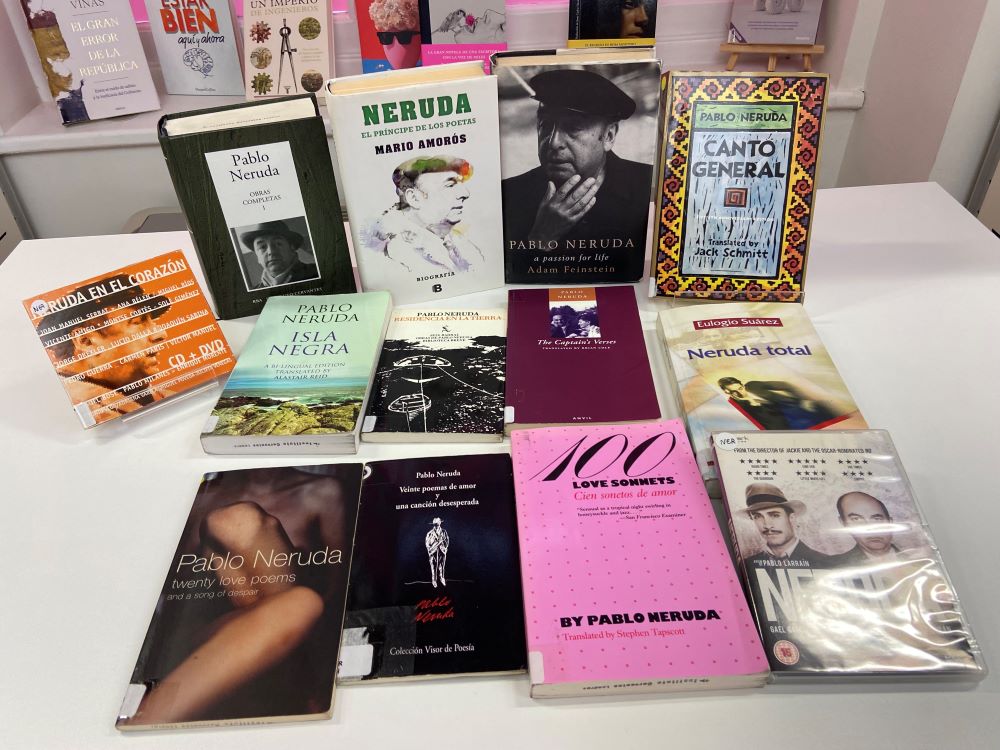
Conmemoramos los 50 años de la muerte del poeta chileno Pablo Neruda, Premio Nobel de Literatura en 1954 con una selección de libros y otros materiales que se encuentran en nuestra biblioteca escritos por él y sobre él.
El español en cifras según el «El español en el mundo 2023. Anuario del Instituto Cervantes»
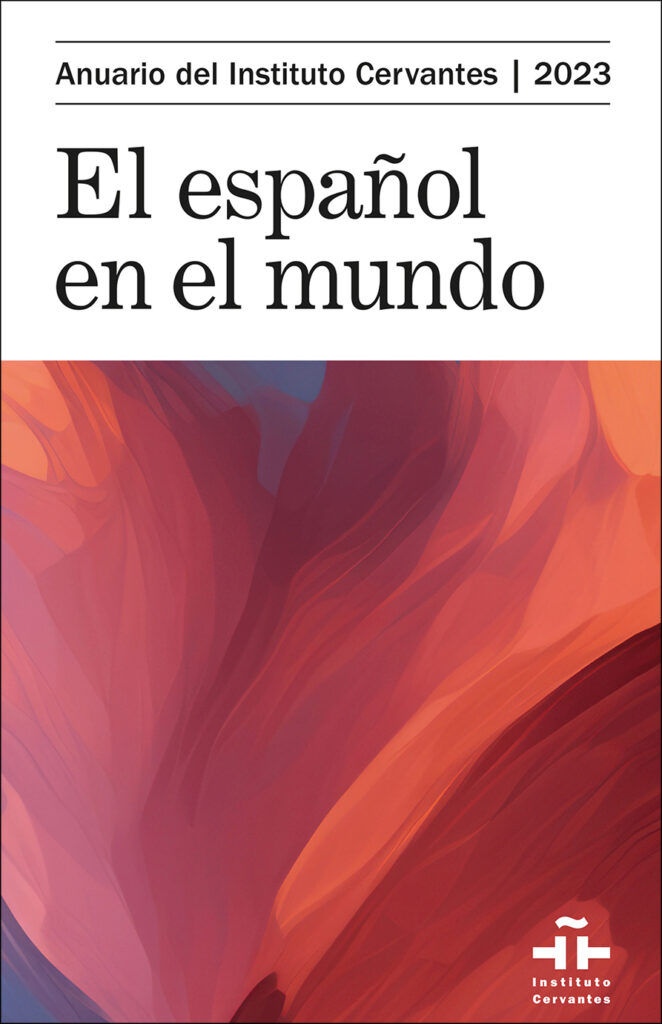
✅En 2023, casi 500 millones de personas tienen el español como lengua materna (el 6,2 % de la población mundial).
✅El grupo de usuarios potenciales de español en el mundo (cifra que aglutina al Grupo de Dominio Nativo, el Grupo de Competencia Limitada y el Grupo de Aprendices de Lengua Extranjera) supera los 599 millones (el 7,5 % de la población mundial).
✅El español es la segunda lengua materna del mundo por número de hablantes, tras el chino mandarín, y la cuarta lengua en un cómputo global de hablantes (dominio nativo + competencia limitada + estudiantes de español), después del inglés, el chino mandarín y el hindi.
✅ El número de hispanohablantes seguirá creciendo en las próximas cinco décadas, pero su peso relativo disminuirá de manera progresiva de aquí a final de siglo. En 2100, solo el 6,4 % de la población mundial podrá comunicarse en español.
✅ En 2060, Estados Unidos será el segundo país hispanohablante del mundo, después de México. El 27,5 % de la población estadounidense será de origen hispano.
✅Más de 23 millones de alumnos estudian español como lengua extranjera en 2023. En concreto, 23.035.198.

Puedes ver aquí la presentación de «El español en el mundo 2023. Anuario del Instituto Cervantes», la principal publicación académica de la institución, en la que cada año se actualizan los datos principales sobre la lengua española en el mundo:
Y consultar todo el el volumen en la web del Instituto Cervantes: https://cvc.cervantes.es/lengua/anuario/anuario_23/default.htm
The Love of Don Perlimplín and Belisa in the Garden
This Wednesday 1st of November is opening night for The Love of Don Perlimplín and Belisa in the Garden, one of the most poetic plays by Federico García Lorca.
A gem of Spanish theatre repertoire that can be seen in both English and Spanish every night in a new and surprising production directed by the Cervantes Theatre Artistic Director Paula Paz.
From 1st until 25th November, for four weeks only, first act in Spanish with English surtitles and second act in English. You can’t miss this production!
Did you know that Don Perlimplín was first performed in the UK in 1945 right after World War II being one of the first Lorca texts to be performed outside of Spain? It was seen as a success, running for roughly 4 years but it also scandalised the bourgeois audience and was authorised but heavily censored.
Joan Littlewood said in 1945 «Lorca’s plays deal with the terrible barrier between the sexes which existed in his country and is perhaps not unknown here. … Surely the first impact of any work of art is disturbing and even destructive: we must risk this ‘unpleasantness’ if our culture is not to atrophy.»
*Research by Professor María Bastianes
Paula Paz releases this potential in Cervantes Theatre’s production of Don Perlimplín which sees the text unleashed whilst sticking true to Lorca’s vision.


